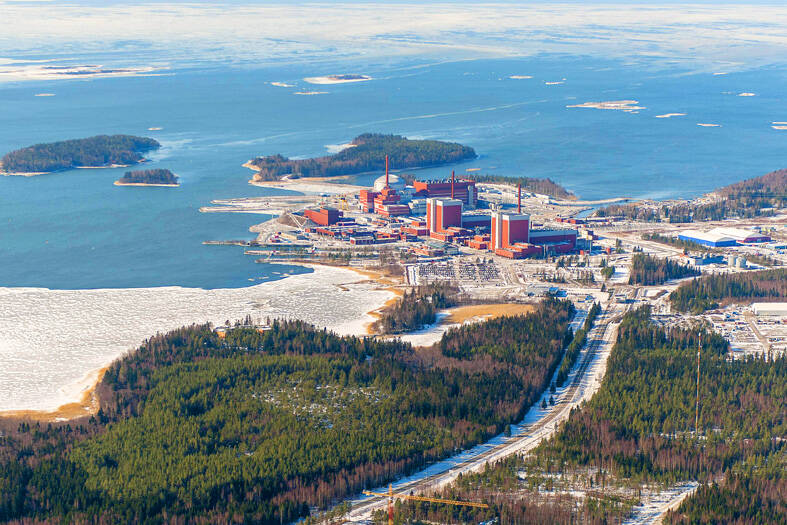Finland’s much-delayed Olkiluoto 3 (OL3) nuclear reactor, Europe’s largest, began regular output early yesterday, its operator said, boosting energy security in a region to which Russia has cut gas and power supplies.
Nuclear power remains controversial in Europe, primarily due to safety concerns, and news of OL3’s start-up came as Germany on Saturday switched off its last three remaining reactors, while Sweden, France, Britain and others plan new developments.
OL3’s operator Teollisuuden Voima Oyj (TVO), which is owned by Finnish utility Fortum Oyj and a consortium of energy and industrial companies, has said the unit is expected to meet about 14 percent of Finland’s electricity demand, reducing the need for imports from Sweden and Norway.

Photo: AFP / TVO / Tapani Karjanlahti
The new reactor is expected to produce for at least 60 years, TVO said in a statement after completing the transition from testing to regular output.
“The production of Olkiluoto 3 stabilizes the price of electricity and plays an important role in the Finnish green transition,” TVO chief executive Jarmo Tanhua said in the statement.
Construction of the 1.6 gigawatt reactor, Finland’s first new nuclear plant in more than four decades and Europe’s first in 16 years, began in 2005. The plant was originally due to open four years later, but was plagued by technical issues.
OL3 first supplied test production to Finland’s national power grid in March last year and was expected at the time to begin regular output four months later, but instead suffered a string of breakdowns and outages that took months to fix.
Russia’s power exports to Finland ended in May last year, when Russian utility Inter RAO said it had not been paid for the energy it sold, a consequence of the widening gulf between Moscow and Europe over the war in Ukraine.
Russian state export monopoly Gazprom PJSC shortly after ended shipments of natural gas to the Nordic nation.
Separately, the German state of Bavaria wants to continue operating nuclear power plants under its own responsibility, state Premier Markus Soeder was quoted as saying, bringing a possible comeback for the power energy Germany finished phasing out on Saturday.
The state, home to many of Germany’s most successful exporting manufacturers, wants the federal government to change the nuclear exit law to allow operating such nuclear power stations under the state’s own responsibility, Soeder said.
“Until the crisis is over, and the transition to renewables succeeds, we must use every form of energy by the end of the decade,” the state government was quoted as saying by Bild am Sonntag newspaper.
“Bavaria is ready to take on this responsibility,” Soeder said, adding that Bavaria also wants to be a pioneer in nuclear fusion research and to construct of its own research reactor.

SEEKING CLARITY: Washington should not adopt measures that create uncertainties for ‘existing semiconductor investments,’ TSMC said referring to its US$165 billion in the US Taiwan Semiconductor Manufacturing Co (TSMC, 台積電) told the US that any future tariffs on Taiwanese semiconductors could reduce demand for chips and derail its pledge to increase its investment in Arizona. “New import restrictions could jeopardize current US leadership in the competitive technology industry and create uncertainties for many committed semiconductor capital projects in the US, including TSMC Arizona’s significant investment plan in Phoenix,” the chipmaker wrote in a letter to the US Department of Commerce. TSMC issued the warning in response to a solicitation for comments by the department on a possible tariff on semiconductor imports by US President Donald Trump’s

The government has launched a three-pronged strategy to attract local and international talent, aiming to position Taiwan as a new global hub following Nvidia Corp’s announcement that it has chosen Taipei as the site of its Taiwan headquarters. Nvidia cofounder and CEO Jensen Huang (黃仁勳) on Monday last week announced during his keynote speech at the Computex trade show in Taipei that the Nvidia Constellation, the company’s planned Taiwan headquarters, would be located in the Beitou-Shilin Technology Park (北投士林科技園區) in Taipei. Huang’s decision to establish a base in Taiwan is “primarily due to Taiwan’s talent pool and its strength in the semiconductor

An earnings report from semiconductor giant and artificial intelligence (AI) bellwether Nvidia Corp takes center stage for Wall Street this week, as stocks hit a speed bump of worries over US federal deficits driving up Treasury yields. US equities pulled back last week after a torrid rally, as investors turned their attention to tax and spending legislation poised to swell the US government’s US$36 trillion in debt. Long-dated US Treasury yields rose amid the fiscal worries, with the 30-year yield topping 5 percent and hitting its highest level since late 2023. Stocks were dealt another blow on Friday when US President Donald

UNCERTAINTY: Investors remain worried that trade negotiations with Washington could go poorly, given Trump’s inconsistency on tariffs in his second term, experts said The consumer confidence index this month fell for a ninth consecutive month to its lowest level in 13 months, as global trade uncertainties and tariff risks cloud Taiwan’s economic outlook, a survey released yesterday by National Central University found. The biggest decline came from the timing for stock investments, which plunged 11.82 points to 26.82, underscoring bleak investor confidence, it said. “Although the TAIEX reclaimed the 21,000-point mark after the US and China agreed to bury the hatchet for 90 days, investors remain worried that the situation would turn sour later,” said Dachrahn Wu (吳大任), director of the university’s Research Center for